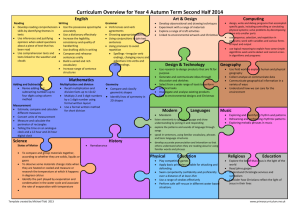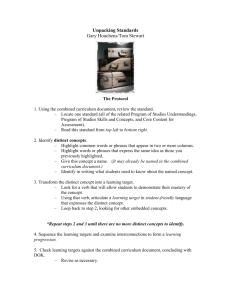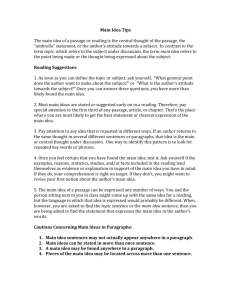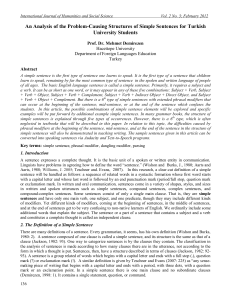ACT Reminders
advertisement
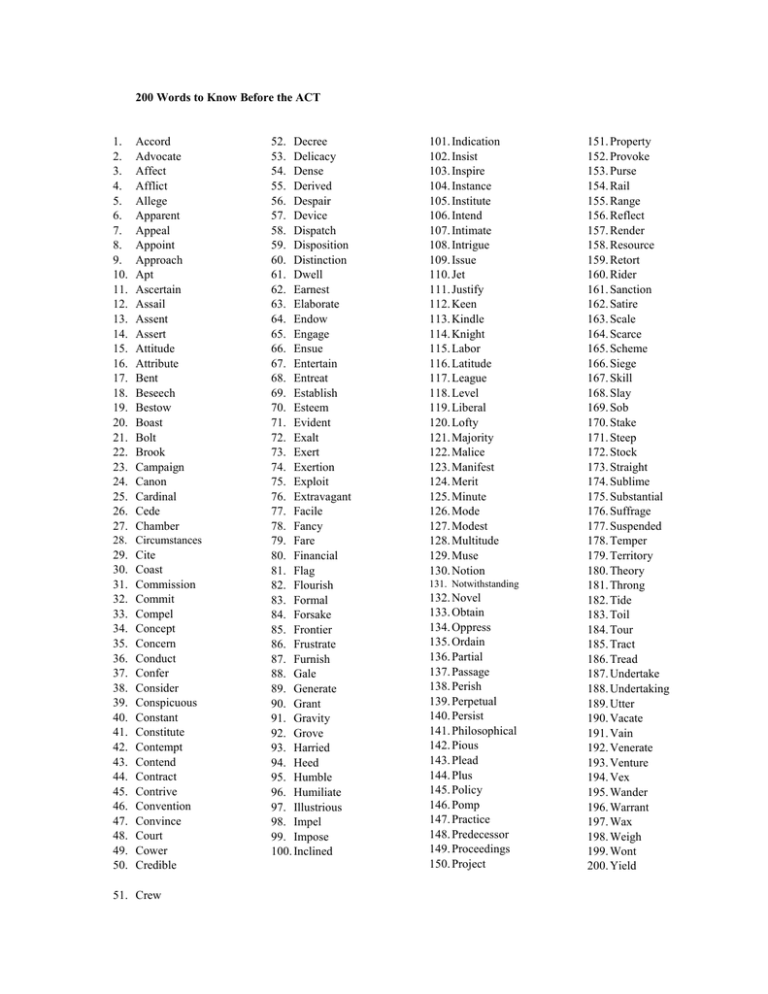
200 Words to Know Before the ACT 1. 2. 3. 4. 5. 6. 7. 8. 9. 10. 11. 12. 13. 14. 15. 16. 17. 18. 19. 20. 21. 22. 23. 24. 25. 26. 27. Accord Advocate Affect Afflict Allege Apparent Appeal Appoint Approach Apt Ascertain Assail Assent Assert Attitude Attribute Bent Beseech Bestow Boast Bolt Brook Campaign Canon Cardinal Cede Chamber 28. Circumstances 29. 30. 31. 32. 33. 34. 35. 36. 37. 38. 39. 40. 41. 42. 43. 44. 45. 46. 47. 48. 49. 50. Cite Coast Commission Commit Compel Concept Concern Conduct Confer Consider Conspicuous Constant Constitute Contempt Contend Contract Contrive Convention Convince Court Cower Credible 51. Crew 52. Decree 53. Delicacy 54. Dense 55. Derived 56. Despair 57. Device 58. Dispatch 59. Disposition 60. Distinction 61. Dwell 62. Earnest 63. Elaborate 64. Endow 65. Engage 66. Ensue 67. Entertain 68. Entreat 69. Establish 70. Esteem 71. Evident 72. Exalt 73. Exert 74. Exertion 75. Exploit 76. Extravagant 77. Facile 78. Fancy 79. Fare 80. Financial 81. Flag 82. Flourish 83. Formal 84. Forsake 85. Frontier 86. Frustrate 87. Furnish 88. Gale 89. Generate 90. Grant 91. Gravity 92. Grove 93. Harried 94. Heed 95. Humble 96. Humiliate 97. Illustrious 98. Impel 99. Impose 100. Inclined 101. Indication 102. Insist 103. Inspire 104. Instance 105. Institute 106. Intend 107. Intimate 108. Intrigue 109. Issue 110. Jet 111. Justify 112. Keen 113. Kindle 114. Knight 115. Labor 116. Latitude 117. League 118. Level 119. Liberal 120. Lofty 121. Majority 122. Malice 123. Manifest 124. Merit 125. Minute 126. Mode 127. Modest 128. Multitude 129. Muse 130. Notion 131. Notwithstanding 132. Novel 133. Obtain 134. Oppress 135. Ordain 136. Partial 137. Passage 138. Perish 139. Perpetual 140. Persist 141. Philosophical 142. Pious 143. Plead 144. Plus 145. Policy 146. Pomp 147. Practice 148. Predecessor 149. Proceedings 150. Project 151. Property 152. Provoke 153. Purse 154. Rail 155. Range 156. Reflect 157. Render 158. Resource 159. Retort 160. Rider 161. Sanction 162. Satire 163. Scale 164. Scarce 165. Scheme 166. Siege 167. Skill 168. Slay 169. Sob 170. Stake 171. Steep 172. Stock 173. Straight 174. Sublime 175. Substantial 176. Suffrage 177. Suspended 178. Temper 179. Territory 180. Theory 181. Throng 182. Tide 183. Toil 184. Tour 185. Tract 186. Tread 187. Undertake 188. Undertaking 189. Utter 190. Vacate 191. Vain 192. Venerate 193. Venture 194. Vex 195. Wander 196. Warrant 197. Wax 198. Weigh 199. Wont 200. Yield Common Sentence Errors—Review this for the English Portion of the ACT Run-on Sentences Run-on sentences happen when a writer joins two independent clauses without correct punctuation. An independent clause that stands alone must end with a period, question mark, or exclamation mark. Sentence Fragments Fragments are phrases, subordinate clauses, or a combination of the two. The length of a sentence can be misleading. A sentence can be just two words (She sits.) while a sentence fragment can be thirty words long. Subject/Predicate (Verb) Agreement To make sure that you don’t have distractions that keep you from keeping the agreement consistent between the subject and predicate, get rid of the distractions. Distractions are often prepositional phrases or other phrases stuck between the subject and verb. Always locate the true subject and the verb. Do they agree? This is the true test. Placement of Modifiers Modifiers should always be as close as possible to the thing/things they are describing. This keeps the sentence from being confusing to the reader. Parallel Sentence Structure Parallelism is simply making sure that the structure of the grammar matches throughout the sentence. This especially applies to a list of nouns, verbs, phrases in the sentence. Look at the sentence to see if the structure shifts. If it does, there is faulty parallelism. For a sentence to be correctly written, the structure should not shift. Combining Sentences Experienced writers know that it is sometimes important to combine several short sentences into one longer sentence. This makes the writing more interesting and keeps the reader’s attention. This improves the style value of the writing. Varying Word Order In the same way that combining sentences can improve the style of a piece of writing, so can varying word order. Writers often start a sentence with a subject and then move on to the verb. However, switching the order from time to time keeps things interesting for the reader. Reading Strategies—Reminders for the Reading AND Science portions of the ACT (TIMING IS EVERYTHING FOR THESE PASSAGES— THIS IS HALF OF THE ACT TEST!) The reading and responding to each passage should take about 8 minutes total. First, scan the passage in 2 minutes. This means that you read only the first sentence of each paragraph. Now you have a general idea of the passage. Next, take 1 minute to read each question to get an idea of what information you’re trying to find in the passage. Finally, take 4 minutes to play detective and find the answers to the questions. With 1 minute left over, go back and re-check your answers. Please do not attempt to read every word of the passages. You simply will not have time.
